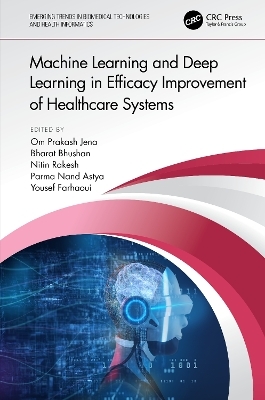
Machine Learning and Deep Learning in Efficacy Improvement of Healthcare Systems
CRC Press (Verlag)
978-1-032-03672-4 (ISBN)
The goal of medical informatics is to improve life expectancy, disease diagnosis and quality of life. Medical devices have revolutionized healthcare and have led to the modern age of machine learning, deep learning and Internet of Medical Things (IoMT) with their proliferation, mobility and agility. This book exposes different dimensions of applications for computational intelligence and explains its use in solving various biomedical and healthcare problems in the real world. This book describes the fundamental concepts of machine learning and deep learning techniques in a healthcare system. The aim of this book is to describe how deep learning methods are used to ensure high-quality data processing, medical image and signal analysis and improved healthcare applications. This book also explores different dimensions of computational intelligence applications and illustrates its use in the solution of assorted real-world biomedical and healthcare problems. Furthermore, it provides the healthcare sector with innovative advances in theory, analytical approaches, numerical simulation, statistical analysis, modelling, advanced deployment, case studies, analytical results, computational structuring and significant progress in the field of machine learning and deep learning in healthcare applications.
FEATURES
Explores different dimensions of computational intelligence applications and illustrates its use in the solution of assorted real-world biomedical and healthcare problems
Provides guidance in developing intelligence-based diagnostic systems, efficient models and cost-effective machines
Provides the latest research findings, solutions to the concerning issues and relevant theoretical frameworks in the area of machine learning and deep learning for healthcare systems
Describes experiences and findings relating to protocol design, prototyping, experimental evaluation, real testbeds and empirical characterization of security and privacy interoperability issues in healthcare applications
Explores and illustrates the current and future impacts of pandemics and mitigates risk in healthcare with advanced analytics
This book is intended for students, researchers, professionals and policy makers working in the fields of public health and in the healthcare sector. Scientists and IT specialists will also find this book beneficial for research exposure and new ideas in the field of machine learning and deep learning.
Dr. Om Prakash Jena is an Assistant Professor in the Department of Computer Science, Ravenshaw University, Cuttack, and Odisha. Dr. Bharat Bhushan is an Assistant Professor of Department of Computer Science and Engineering (CSE) at School of Engineering and Technology, Sharda University, Greater Noida, India. Dr. Nitin Rakesh is the Head of Computer Science & Engineering Department for B.Tech/M.Tech (CSE/IT), B.Tech CSE-IBM Specializations, B.Tech CSE-I Nurture, BCA/MCA, BSc/MSc-CS at School of Engineering and Technology,at Sharda University, India. Dr. Parma Nand is a Dean, School of Engineering Technology, Sharda University Greater Noida. Dr. Yousef Farhaoui is a Professor at Moulay Ismail University, Faculty of Sciences and Techniques, Morocco.
1. Machine Learning in Healthcare: An Introduction 2. A Machine Learning Approach to Identify Personality Traits from Social Media 3. Influence of Content Strategies on Community Engagement over the Healthcare-Related Social Media Pages in India 4. The Impact of Social Media in Fighting Emerging Diseases: A Model-Based Study 5. Prediction of Diabetes Mellitus Using Machine Learning 6. Spectrogram Image Textural Descriptors for Lung Sound Classification 7. Medical Image Analysis Using Machine Learning Techniques: A Systematic Review 8. Impact of Ensemble-Based Models on Cancer Classification, Its Development, and Challenges 9. Performance Comparison of Different Machine Learning Techniques towards Prevalence of Cardiovascular Diseases (CVDs) 10. Deep Neural Networks in Healthcare Systems 11. Deep Learning and Multimodal Artificial Neural Network Architectures for Disease Diagnosis and Clinical Applications 12. A Temporal JSON Model to Represent Big Data in IoT-Based e-Health Systems 13. Use of UAVs in the Prevention, Control and Management of Pandemics 14. Implicit Ontology Changes Driven by Evolution of e-Health IoT Sensor Data in the τOWL Semantic Framework 15. Classification of Text Data in Healthcare Systems – A Comparative Study 16. Predicting Air Quality Index with Machine Learning Models
| Erscheinungsdatum | 11.05.2022 |
|---|---|
| Reihe/Serie | Emerging Trends in Biomedical Technologies and Health informatics |
| Zusatzinfo | 56 Tables, black and white; 92 Line drawings, black and white; 41 Halftones, black and white; 133 Illustrations, black and white |
| Verlagsort | London |
| Sprache | englisch |
| Maße | 156 x 234 mm |
| Gewicht | 694 g |
| Themenwelt | Informatik ► Theorie / Studium ► Künstliche Intelligenz / Robotik |
| Medizin / Pharmazie ► Gesundheitswesen | |
| Technik ► Elektrotechnik / Energietechnik | |
| ISBN-10 | 1-032-03672-9 / 1032036729 |
| ISBN-13 | 978-1-032-03672-4 / 9781032036724 |
| Zustand | Neuware |
| Informationen gemäß Produktsicherheitsverordnung (GPSR) | |
| Haben Sie eine Frage zum Produkt? |
aus dem Bereich


